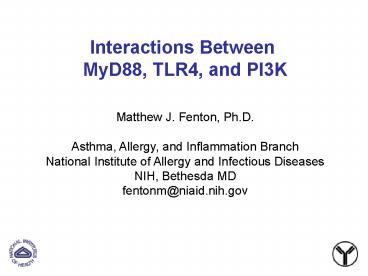Interactions Between - PowerPoint PPT Presentation
1 / 18
Title:
Interactions Between
Description:
Bulendran and Ahmed, Cell 124: 849-863, 2006 (TIRAP = MAL) ... From the Division of Gastroenterology. Beth Israel Deaconess Medical Center ... – PowerPoint PPT presentation
Number of Views:32
Avg rating:3.0/5.0
Title: Interactions Between
1
Interactions Between MyD88, TLR4, and
PI3K Matthew J. Fenton, Ph.D. Asthma, Allergy,
and Inflammation Branch National Institute of
Allergy and Infectious Diseases NIH, Bethesda
MD fentonm_at_niaid.nih.gov
2
Toll-like receptor (TLR) structure
Bell et al., Trends Immunol. 24 528-33, 2003
3
TLR proteins, their ligands, and their adaptor
proteins
Bulendran and Ahmed, Cell 124 849-863,
2006 (TIRAP MAL)
4
TLR adaptor proteins and signaling pathways
ONeill and Bowie, 2007 (TIRAP MAL)
5
IL-1, IL-6, TNF, IP-10
ONeill and Bowie, 2007 (TIRAP MAL)
6
IFN-a/b, RANTES
ONeill and Bowie, 2007
7
TLR adaptor proteins contain a conserved TIR
domain
8
TLR adaptor proteins contain a conserved TIR
domain
YXXM
Mammalian MyD88s
YXXM
hMyD88 YKAM mMyD88 YKAM rMyD88 YKAM bMyD88
YKPM pMyD88 YKSM
9
Phosphoinositide 3 kinase (PI3K)
- PI3K is a lipid kinase that converts
phosphatidyl-inositol-3,4-bisphosphate
(PI-3,4-P2) to phosphatidylinositol-3,4,5-trisphos
phate (PIP3) - PI3K is a critical regulator of cell
proliferation and survival - PI3K is a heterodimer consisting of a catalytic
subunit (p110 family) and a regulatory subunit
(p85 family) - PI3K binds to SH2 domains via a YXXM motif
- Pharmacologic inhibitors of PI3K enhance
TLR-dependent macrophage activation
10
Central hypothesis
- Given the reported role of PI3K as a negative
regulator of TLR signaling, we hypothesized that
one or more PI3K subunits can physically interact
with TLR proteins, or their downstream adapter
proteins. - Physical interaction between PI3K subunits and
TLR proteins (or their adapter proteins) may
correlate with reduced TLR signaling.
11
Questions addressed by this study
- Does TLR signaling activate PI3K?
- Do PI3K subunits physically interact with TLR
proteins, or their adapter proteins? - Is the YXXM motif present in MyD88 required for
PI3K binding and regulation of TLR signaling by
PI3K? - How does PI3K activity ultimately down-regulate
TLR signaling?
12
LPS stimulates TLR4-and MyD88-dependent
activation of Akt
13
The p85 subunit of PI3K associates with TLR4
14
The PI3K p85 subunit differentially associates
with WT and mutant MyD88 proteins
15
Differential effects of WT and mutant MyD88
proteins on TLR4 signaling
- HEK293 cells transfected with
- NF-kB-luciferase reporter
- TLR4 and MD2 expression plasmids
- WT or mutant MyD88 expression plasmids
- Note overexpression drives auto-activation of
TLR signaling, which is indicated by lack of
LPS-responsiveness
16
Differential effects of WT and mutant MyD88
proteins on TLR4 signaling
Note MyD88 mutant M260A, which bind most
strongly to p85 of all mutants tested (panel A),
reduces TLR signaling to the level of a dead
MyD88 (DTIR, panel B)
17
Hypothetical model of TLR4, MyD88, and p85
interactions
18
Acknowledgements
From the Department of Microbiology and
Immunology University of Maryland School of
Medicine, Baltimore, MD Michelle H. W. Laird
Andrei Medvedev Stefanie N. Vogel From the
Division of Gastroenterology Beth Israel
Deaconess Medical Center Harvard Medical School,
Boston, MA Sang Hoon Rhee































